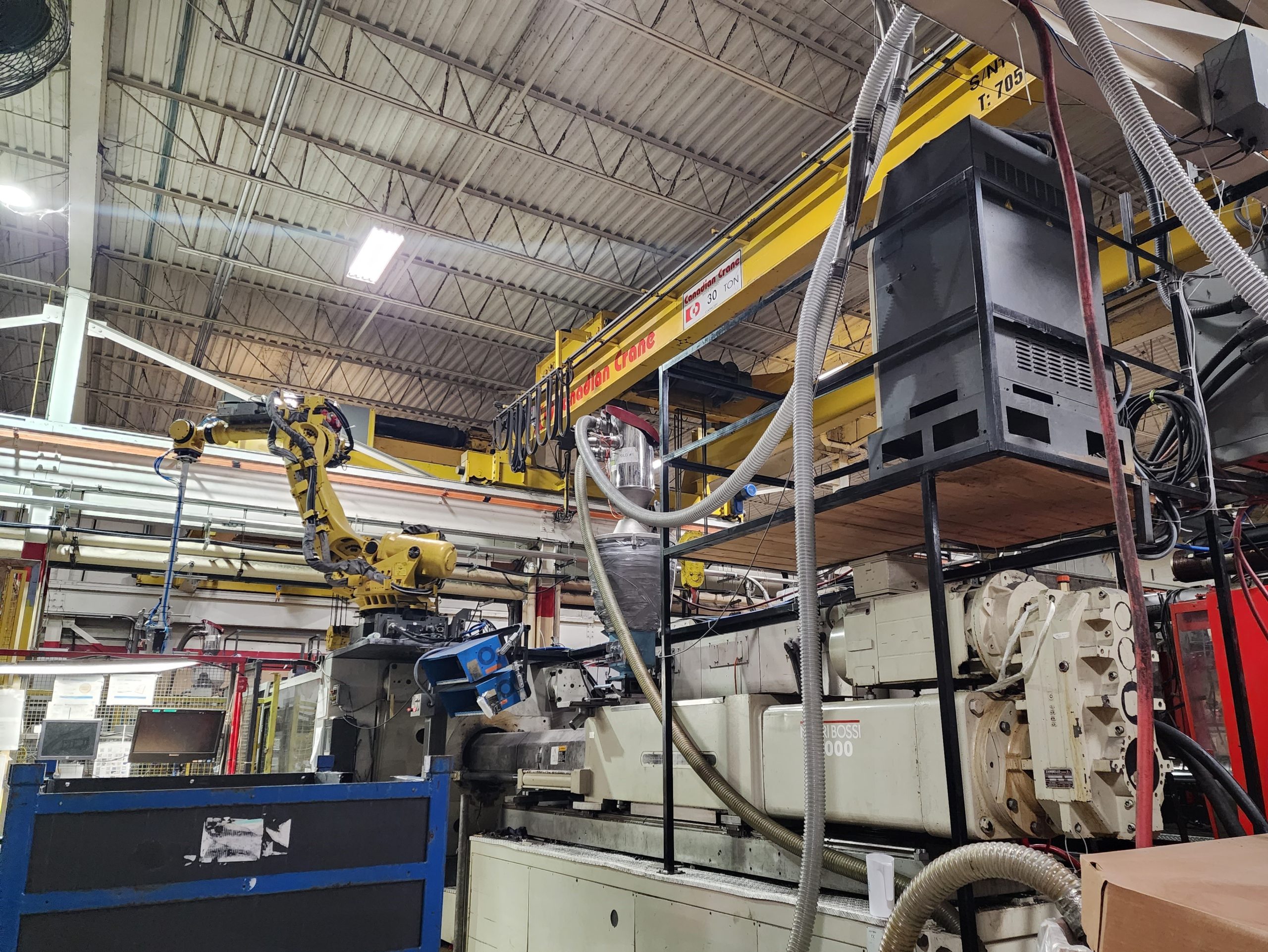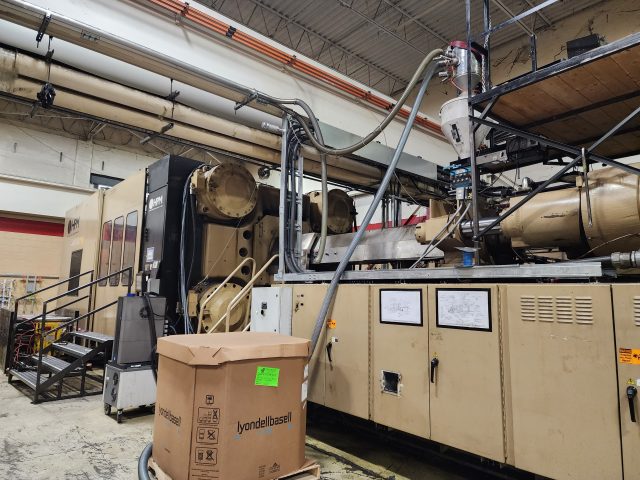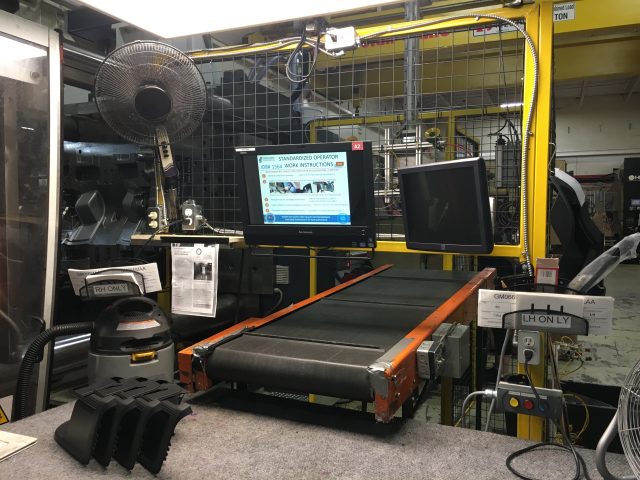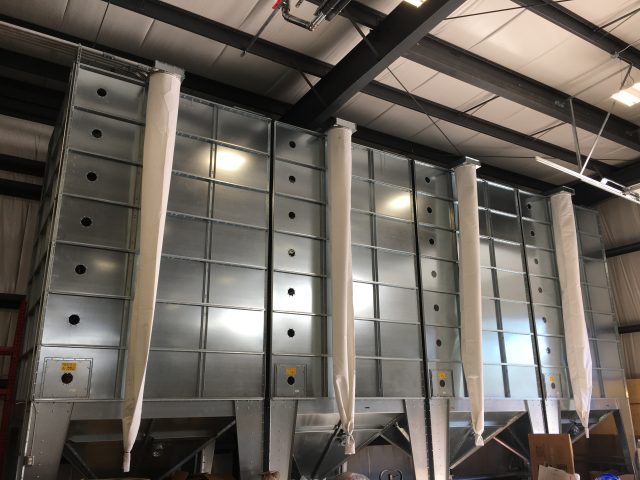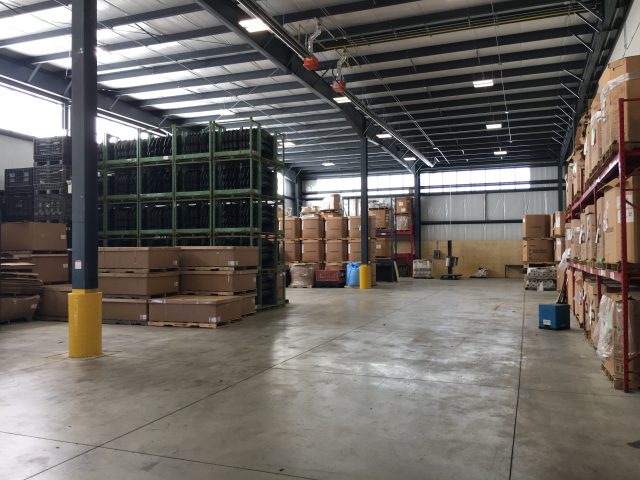-
Headquarters -
2862 Kew Dr, Windsor, ON, N8T 3C6
-
Year established -
2004
-
NAICS -
326193 - Motor vehicle plastic parts manufacturing
-
Major expansions -
2008, 2018
-
Employees -
30
-
Exports -
United States
-
Download -
Stratus Plastics International
When Colby Wu designed robotics lines at Ford’s Dearborn Assembly Plant in 2010, he was impressed by the improvement in productivity. After returning to Windsor in 2012 to work in the family business alongside his father, he was intent on helping the injection molding company grow by adopting similar technologies.
Today, Windsor-based Stratus Plastics is a unique Tier 2 automotive parts supplier that boasts several robots and large tonnage injection molding machines more commonly operated by Tier 1 suppliers. Wu credits hard work by employers, strong customer relationships, and the timely adoption of robots and automation for the sustained growth of the company. The last factor was especially important for the company to continue expanding over the years.
Everything started to mesh well for the company once automation and robotics were in place.
“Everything started to mesh well for the company once automation and robotics were in place,” Wu says. Advanced production technologies allowed Stratus to secure larger contracts from its primary customers, the Tier 1 automotive parts manufacturers. That led to the company growing from five to 30 employees within two decades. At the same time, the company increased its injection molding machine count from three to 11 large tonnage machines, which continue to provide the company with a strong competitive advantage.
“It was the right time to do it,” Wu says. “We had to take the chance.” Indeed, the automotive industry was changing in the early 2000s. The use of plastic parts was increasing rapidly as automation and robotics made injection molding an efficient and cost-effective production process.
Automation was not always a necessity to grow but you cannot survive in this industry without it now.
“Automation was not always a necessity to grow, but you cannot survive in this industry without it now,” Wu says. It was important to participate in this industry-wide transformation early on. Past experiences of Wu’s father, William, who founded the company, taught him that technological change could result in significant shifts in the industry landscape. It was better to take advantage of change than to fight it.
Before computer-aided design (CAD) software became widely available, Wu’s father owned Metro Geomatics which made physical models of automobiles. When CAD became an industry staple in the 1990s, digitizing the modeling process, he decided it was time to close that business. He then started Mega Mold International, a company that manufactured tools, dies and fixtures for the automotive industry.
The rise of plastic injection molding in the automotive world presented itself as a new business opportunity to William Wu. He decided to sell Mega Mold International and start Stratus. A strategic thinker, he also encouraged his son Colby to pursue an education in automation and robotics controls, so he could use his technical knowledge to help grow the new business.
Like almost the entire automotive industry, Stratus did not anticipate the 2008-2009 financial crisis and almost faced closure in 2008.
Before Stratus could invest in advanced technologies, however, it first had to overcome the impacts of the 2008-2009 global financial crisis. When Stratus was initially established at a 5,000 square-feet facility in 2004, it only had three plastic injection molding machines with capacities between 300 and 1,000 tons. There were no robots. The company’s main role was carrying out tryouts–the process of loading up a tool into the press in an attempt to produce a part for the first time. The initial customers were primarily Tier 1 automotive parts suppliers, including some major US-based companies with operations in Windsor and throughout Ontario. Wu’s father has had strong relationships with some of these companies since his days running Metro Geomatics and Mega Mold International.
Like almost the entire automotive industry, Stratus did not anticipate the 2008-2009 financial crisis and almost faced closure in 2008. Flex-N-Gate provided the company with a lifeline by offering it some after-model production runs and the associated production tools. Working only a day per week for a year, which led to Stratus shedding much of its workforce, the company weathered the economic downturn. Around the same time, the company also installed a 2,000-ton injection molding machine it had pre-ordered before the financial crisis from Negri Bossi, a leading global injection molding machine supplier based in Italy. Stratus even moved to a larger, 24,000 square-feet facility to accommodate that new machine.
Once the company started recovering from the global financial crisis, Wu and his father knew that it was time to embark on new expansion projects.
After these changes, Stratus transformed from a tryout facility to a production facility. That put the company on a sustainable growth path by giving it a unique competitive advantage. The main business became supporting Tier 1s with capacity constraints and providing them with high-quality production parts. In time, the company got additional business from well-known auto parts manufacturers. In 2010, Stratus became certified to ISO/TS 16949 quality management system standards to better meet its customers’ high standards in quality.
Once the company started recovering from the global financial crisis, Wu and his father knew that it was time to embark on new expansion projects. At that point, Wu’s knowledge of automation and robotics controls and his experience from working at Ford’s Dearborn Assembly Plant came in handy.
Finding capital to fund equipment investments, however, was still a challenge. At one point, Stratus secured a sizable contract that would open up a lot of future opportunities for the company. However, financial resources were insufficient to make the down payment to secure the equipment necessary to fulfill the contract.
I didn’t know how to write grant applications...The business advisors at MEDJCT’s Windsor office guided me through the entire process.
That’s when Wu started exploring the investment support programs available through the Ontario government. He worked with the Ministry of Economic Development, Job Creation and Trade (MEDJCT) Business Advisory Services office in Windsor to apply to grant programs. “I didn’t know how to write grant applications,” he says. “The business advisors at MEDJCT’s Windsor office guided me through the entire process.”
Wu still recalls the day a portion of the grant, extended as a part of the Southwestern Ontario Development Fund (SWODF), hit the company’s bank account. “Without that grant, the business would not exist today.” He explains that a portion of the funding arrived on the same day Stratus had to make the down payment to secure the machine. Thanks to that support, Stratus was able to acquire the equipment to kick off its growth journey.
“A lot of Tier 2 and Tier 3 automotive parts manufacturers would not be here today without the government support,” Wu says. In the case of Stratus, Wu points out, the connection between government grants to support manufacturing equipment investments, business expansion, and generating more job opportunities for Ontarians is clear.
We need more government business advisors. The use of third party agencies to get government grants is posing a challenge to small businesses' ability to access these opportunities.
Since making critical investments to adopt new technologies, install robotics, and improve efficiency, the company has been gradually hiring more people and has since expanded its facility to 35,000 square feet. The ability to reach higher volume production with the use of robots and new technologies has been key to unlocking this growth.
“We need more government business advisors,” Wu adds. “The use of third-party agencies to get government grants is posing a challenge to small businesses’ ability to access these opportunities because they can’t afford to hire third parties.”
While acknowledging the importance of production technologies, Wu points to the contributions employees have made to the company’s growth. “The people are your business. You could buy the machines anywhere.”
Thanks to Windsor’s unique talent pool, Stratus has been able to hire new employees with strong skill sets with minimal difficulty.
Thanks to Windsor’s unique talent pool, Stratus has been able to hire new employees with strong skill sets with minimal difficulty. Wu says Windsor has a small-town feeling where people support each other. In addition, there is a substantial number of people who grow up in or adjacent to the automotive industry. That creates a unique environment for people to gain specialized knowledge difficult to find elsewhere.
Wu describes the hiring process for his small business as akin to “growing a family.” He adds that for a small business owner, seeing employees’ development over time is something to feel proud of. He takes great pride in Stratus’ employees and Windsor’s talent pool in general. As the industry is growing rapidly in the city again, he emphasizes that businesses need people, and people need housing and other services to settle in the area.
Windsor’s manufacturing sector and Stratus’s experience in embracing change will help keep the city’s economy strong and resilient.
For more information about Stratus Plastics International, visit their website.
Published: February 6, 2024
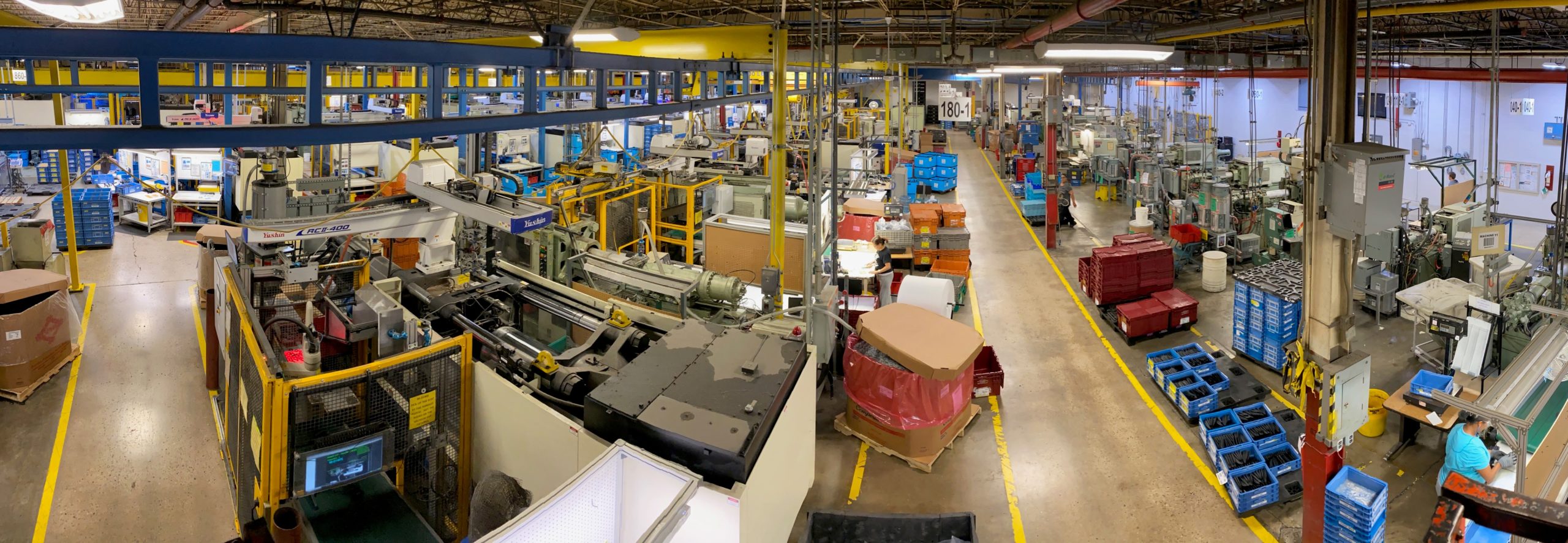
MVA Stratford
MVA Stratford Inc. is a manufacturer of custom plastic injection molded components. The firm has acquired customers from a diverse range of industries and developed strong, long-term relationships with its Tier 1 automotive customers.
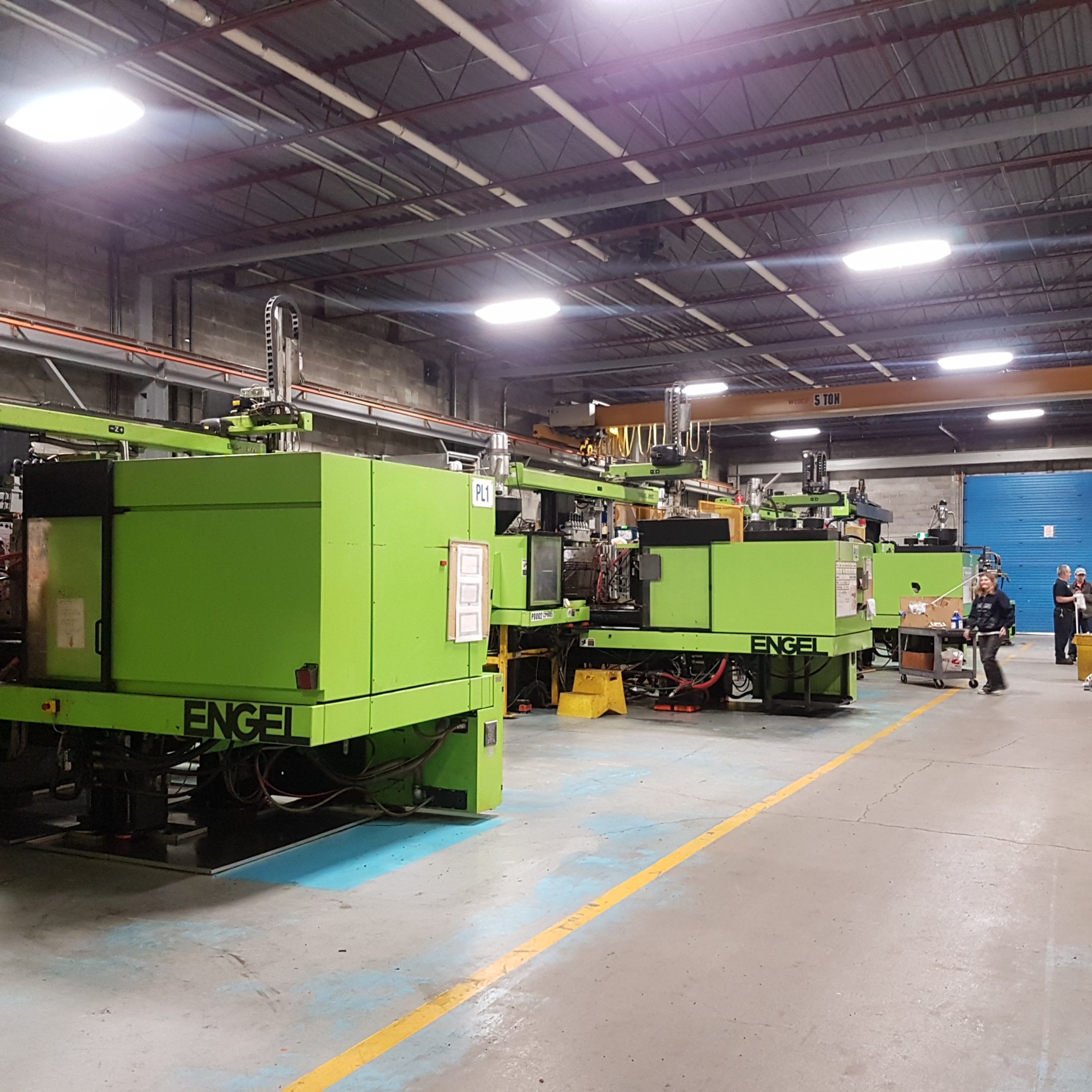
WEGU Manufacturing Inc.
WEGU Inc. is a multi-international manufacturer of molded rubber and plastic products. Product design assistance, engineering, tooling development, prototyping, testing and manufacturing, and materials analysis, are all offered in house. WEGU Inc. prides itself on the ability to consistently meet all of their client’s physical and chemical requirements for product durability, flexibility, noise and vibration mitigation, and abrasion resistance.
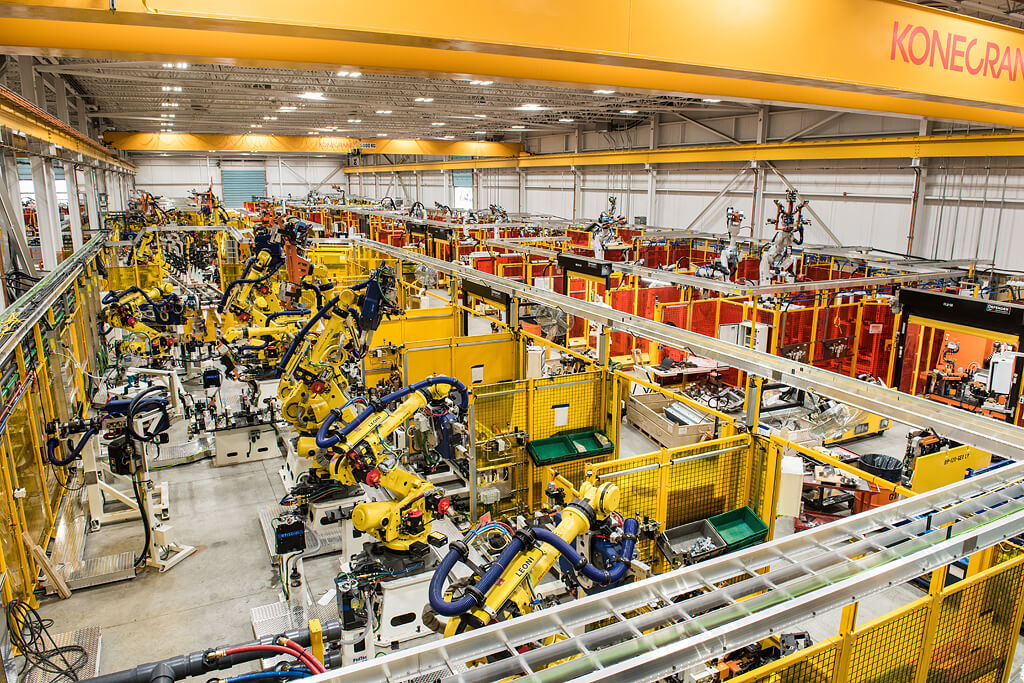
CenterLine
CenterLine is a manufacturer of custom automated welding and assembly lines, as well as resistance welding-related products. The firm is known worldwide as a leader in fastener welding technology, which is used in the production of automotive components.
